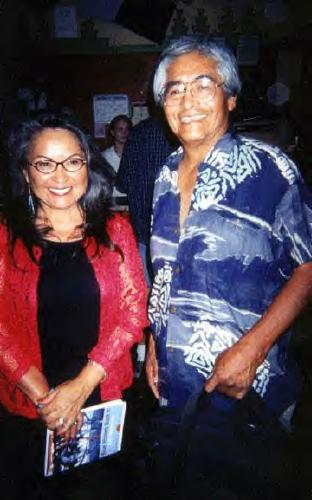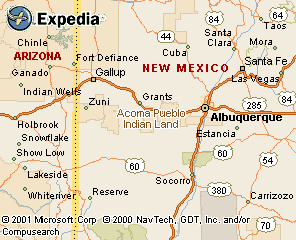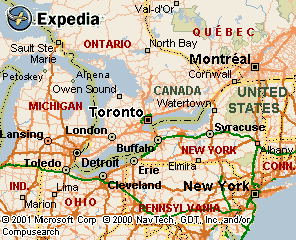|
|
Canku Ota |
|
|
(Many Paths) |
||
|
An Online Newsletter Celebrating Native America |
||
|
June 16, 2001 - Issue 38 |
||
|
|
||
|
On Ortiz, Threading the Americas |
||
|
by Brenda Norrell Indian Country Today Staff |
||
|
photo of Lucy Tapahonso, Simon Ortiz at Tucson Poetry Crawl by Brenda Norrell |
 TUCSON,
Ariz. - Packing now for Canada where he will teach Native language and Aboriginal studies at the University of
Toronto, Simon Ortiz holds in his hand the latest book to include his essays. TUCSON,
Ariz. - Packing now for Canada where he will teach Native language and Aboriginal studies at the University of
Toronto, Simon Ortiz holds in his hand the latest book to include his essays.The brightly-colored children's book, "Questions & Swords, Folktales of the Zapatista Revolution," as told by Subcomandante Marcos, has just arrived with Ortiz' name alongside Marcos' on the cover. "When we heard of the Zapatista uprising in Chiapas, it was good news for Indian people," Ortiz says of the message in his essays. "With the Zapatistas led by Mayans, this could not be anything but good news." In Tucson, the departure of the Acoma Pueblo poet and author saddens friends. He has led marches for the Zapatistas and against the North American Free Trade Agreement here during the past seven years, while reading poetry and lecturing across the Americas. Over breakfast, Ortiz said his decision to move to Toronto continues his life's struggle to make people more aware of Indigenous people from Canada to South America. "I've always tried to invoke an Indigenous international perspective. There are a lot of Native people out there in the Americas." Ortiz sees a new energy emerging in the Indigenous world. "Assertiveness, political and social, is coming out of these times. Assertiveness, rather than defensiveness." Rather than simply fighting innumerable odds, he said Indigenous people are expressing assertiveness and the result is sovereignty. "Wherever we may live, it is important to recognize that Native people have to speak from the point of assertion." Speaking with defensiveness and negativeness "makes us less than we are. "Assertion is recognizing who we are and what we are, trusting and believing in our ancestors." Ortiz began writing poetry at a young age in Acoma Pueblo, in times of assimilation, colonization, termination and relocation. "I was always curious. That's a natural instinct to wonder about life, to be concerned." Ortiz went on to write about alcoholism, the streets of Gallup, fighting coal mining, turquoise jewelry on Indians everywhere and friends who die too young. "I write down the experience of being an Indian in America. "I write down the experience of being subjugated, of being ignored." Place and identity are themes of his poetry. "Acoma reaches wherever I am," he said. For Ortiz, poetry is a way to reach out. "Poetry is language. It is the way I perceive what is around me. The language of poetry helps me locate myself and be certain of what I am doing. "Hopefully, people can see something of themselves. I tell you about me and my world, so you may be able to see yourself." Ortiz' personal favorite of his more than 30 published books is "From Sand Creek," a book of three poems published in 1974 and released a second time in 1981. "The book is a look at one's self, myself, and what this place is in the history of the person, and how it relates to the outlook America has for Native people." Ortiz, now in sobriety, wrote the book-length poem while in alcohol treatment in a veteran's hospital in Colorado. It parallels the 1864 massacre of Cheyenne and Arapaho in southeastern Colorado and the Vietnam War. "I was looking at myself as a former GI-military person." But, he said, the poems also examine what the colonizer did to Native American people and how the colonizer was victimized. Today, he speaks out against economic and trade agreements undertaken without Indigenous consultation. "The struggle against the North American Free Trade Agreement is the continuing struggle against the industrialization of our lands. "It diminishes not only Native people, but all people. It leaves us at the mercy of the global economy if we don't have a say-so in it. It is necessary for us to rise up against it. "We need to derail the train." "Woven Stone," published by the University of Arizona Press, is a compilation of three books of his poetry. "Blues Song for the Phoenix Bus Depot Derelict," and "Our Homeland, a National Sacrifice Area," are among the poems published here. Ortiz writes of thirst, uranium mining, births of his children, hawks, thunder and survival. In "Relocation," he writes, "I am lonely for myself." In the prologue, he writes of journeys, of leaving and returning. "Let us go again, brother; let us go for the shiwana. Let us make our prayer songs. We will go now. Now we are going. "The man returns to the strength that his selfhood is, his home, people, his language, the knowledge of who he is. The cycle has been traveled; life has beauty and meaning; and it will continue because life has no end." Ortiz has lived and taught throughout the West. While looking forward to the international venue of Toronto, he hopes to return to Tucson someday. "I do want to return here, it's part of the Southwest, it's not that far from Acoma." Brenda Norrell reports from the Southwest. She can be reached at (520) 490-8558 or by e-mail bnorrell@IndianCountry.com. |
|
You can look on the maps of North America to see just how far Simon Ortiz is going to be from home |
|
|
|
Simon Ortiz |
|
|
||
|
|
||
| Canku Ota is a free Newsletter celebrating Native America, its traditions and accomplishments . We do not provide subscriber or visitor names to anyone. Some articles presented in Canku Ota may contain copyright material. We have received appropriate permissions for republishing any articles. Material appearing here is distributed without profit or monetary gain to those who have expressed an interest. This is in accordance with Title 17 U.S.C. section 107. | ||
|
Canku Ota is a copyright © 2000, 2001 of Vicki Lockard and Paul Barry. |
||
|
|
|
|
|
The "Canku Ota - A Newsletter Celebrating Native America" web site and its design is the |
||
|
Copyright © 1999, 2000, 2001 of Paul C. Barry. |
||
|
All Rights Reserved. |


